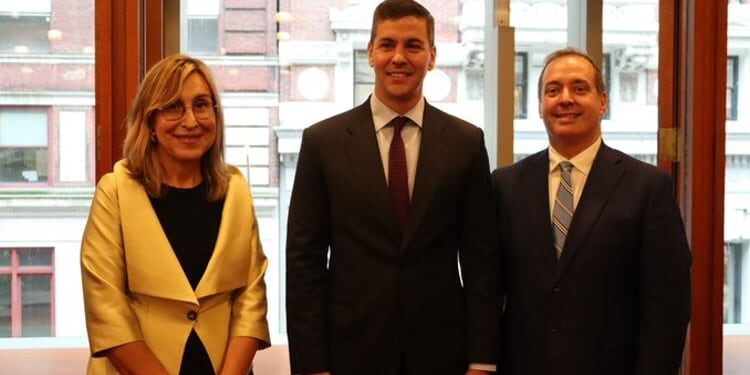The Diplomat
The Business Council Alliance for Ibero-America (CEAPI) and The Adam Smith Center for Economic Freedom, belonging to Florida International University (FIU), have held, within the framework of the 79th UN General Assembly in New York, meetings with five heads of state of Latin America.
Núria Vilanova, president of CEAPI, Carlos Díaz-Rosillo, founding director of The Adam Smith Center and business leaders from the region have met these days with the president of Ecuador, Daniel Noboa; the president of the Dominican Republic, Luis Abinader; the president of Guatemala, Bernardo Arévalo; the president of Panama, José Raúl Mulino and the president of Paraguay, Santiago Peña. In addition, a sixth meeting was held with four Peruvian ministers: the heads of Foreign Affairs, Elmer Schialer; Justice and Human Rights, Eduardo Arana; Foreign Trade and Tourism, Úrsula Desilú León; and Economy and Finance, José Arista Arbildo.
In the first of the economic and business meetings, on September 22, Ecuadorian President Noboa expressed his willingness to undertake transformations and reforms in the future: “If the voters re-elect us, the first few months will be intense in unblocking regulations, laws and everything necessary for the processes that facilitate investment to be streamlined. We are going to be aggressive in job creation. Also in tax matters, making things more flexible, but with efficient collection. A balance of low corporate taxes and the fight against evasion.”
On September 23, three meetings were held with Presidents Abinader and Mulino and with four ministers of the Republic of Peru. In the first, Luis Abinader highlighted that in the Dominican Republic, “the key to these last four years and the next four years is the public-private alliance, but not only the legal framework, but the attitude we have to have to collaborate and make new ventures work.”
For his part, the Panamanian president, José Raúl Mulino, highlighted that his “is a pro-private enterprise government” and that “in recent months we have put -he said- a lot of emphasis on cancelling outstanding debts with the private sector.” “The best way to attract foreign investment is with clear rules of the game, eliminating corruption and being very clear about the importance of the rule of law,” he stressed.
The ministers of the Republic of Peru, for their part, reflected on the political, social and economic situation of their country and detailed the economic and legal framework and the business and investment opportunities offered by the Andean country. The Minister of Justice and Human Rights pointed out that “one of the characteristics of Peru is its legal security, which is being a key element in the country’s growth, which this year expects to reach a rate of 3.1%.”
Guatemalan President Bernardo Arévalo, in a meeting held on September 25, invited investors to “build a country where opportunities and benefits are for everyone, where macroeconomic and fiscal stability are the starting point, because they enable the conditions to continue advancing in the generation of more and better jobs, promote inclusive growth, reduce poverty and inequality, and where Guatemala becomes a land of possibilities, reaching investment grade.”
In the last of the meetings, on September 26, Santiago Peña stressed that “today Paraguay is determined to build its return. Paraguay has a fundamental role as a center of integration, not only for our country, but for the entire Latin American region, which to this day remains the least integrated region in the world.”
CEAPI President, Núria Vilanova, stressed the importance of these meetings within the framework of the UN and emphasized that they place CEAPI as a reference for the business community to weave international ties between the Ibero-American region and the Spanish-speaking community in the United States. “In addition to thanking, we offer the presidents the firm will of the 300 CEAPI members to support and invest in private enterprise and development in Ibero-America. It is important to continue working on integration between companies in Spain, Latin America and the United States. And CEAPI should and wants to be there,” she said.
Likewise, Carlos Díaz-Rosillo, highlighted that “it is a pleasure for The Adam Smith Center to hold these types of events, because we are interested in meeting leaders who are doing interesting things in their countries. Our goal is to promote the study of the free market. We are a center of thought and action in which we put a lot of emphasis not only on theory, but more importantly on practice to inspire future generations to be able to implement public policies that defend the free market and promote democracy.”






